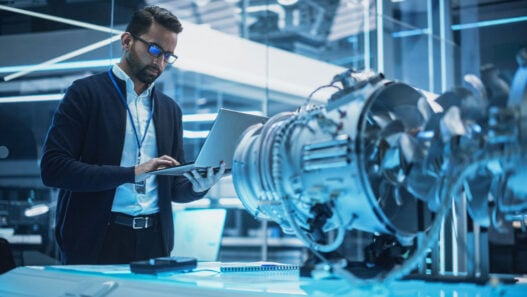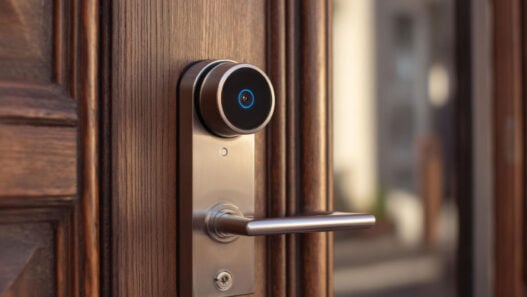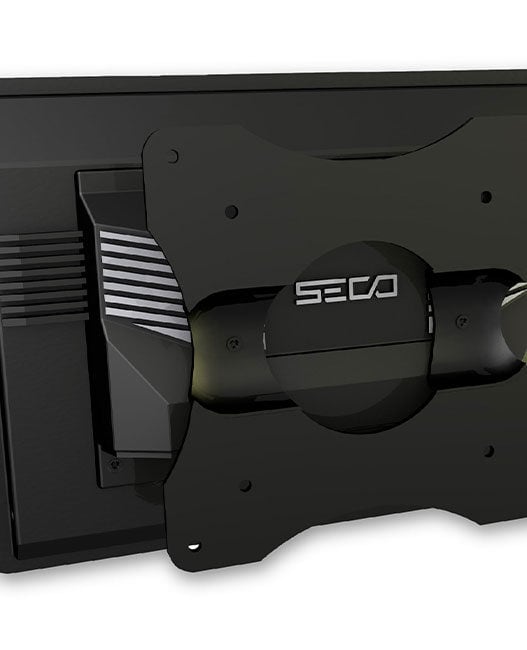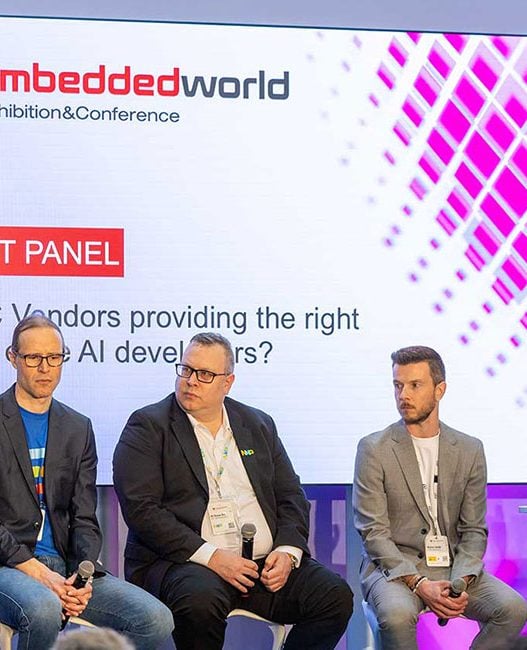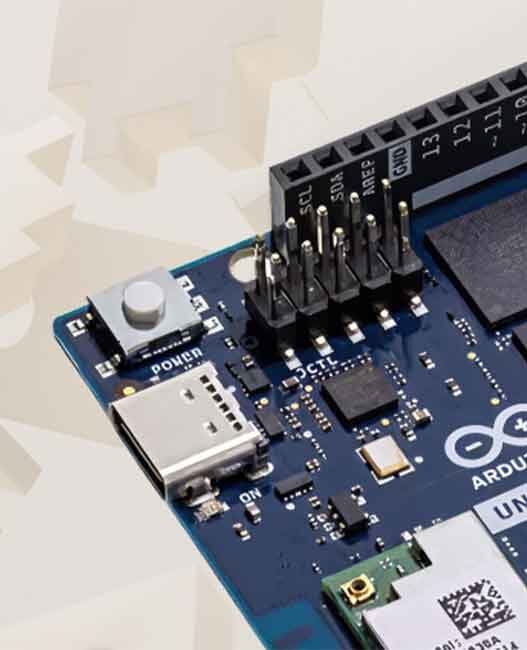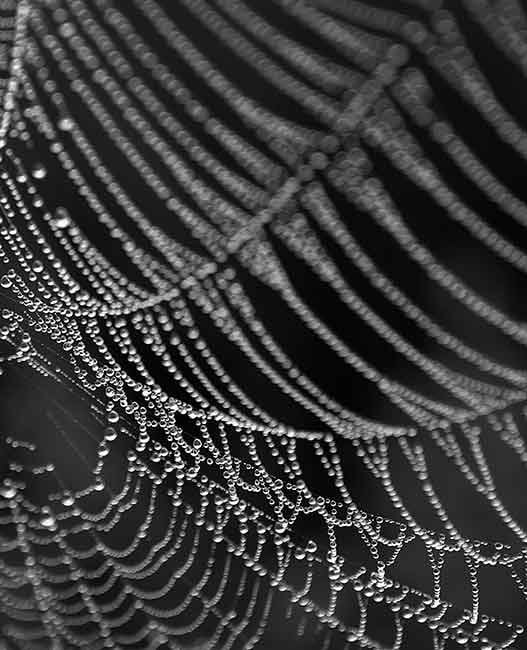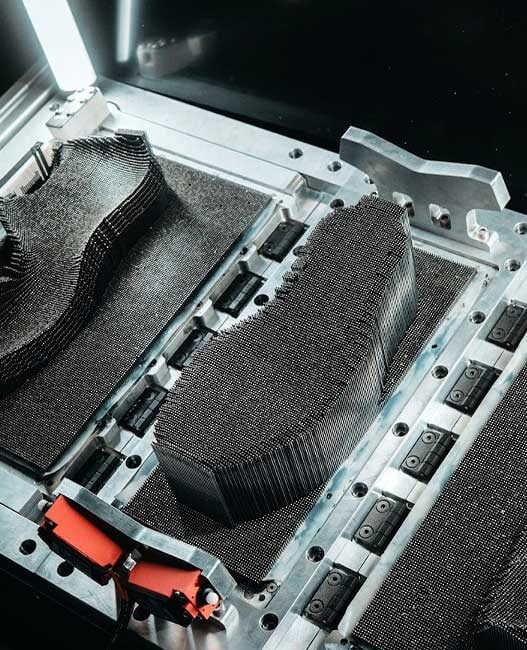- What equipment have you been using and to produce the masks, and what does the equipment usually produce?
At SharkNinja, we follow a 24hr development cycle which spans the Boston, China and London offices and 3D printers play a key role in this. Usually, the bank of printers is used to produce development parts for our in-house engineering teams, but in recent weeks, we have been using the Stratasys F370 FDM printers to produce face shields in M30-ABS material.
- How easy are they to make?
The integrated software we utilise at SharkNinja allows us to set-up and operate our printers remotely and IP cameras form part of the hardware, allowing us to monitor the prints whilst working from home. This approach has paid dividends given the current Covid-19 restriction, allowing us to minimise any unnecessary travel to our central London Design Office.
- How long do they take to make?
Currently, we able to print up to 125 face shield frames over a 48hr period, these are then packed and paired with clear PVC visors ready for shipping.
- Where did the idea to help come from?
The original idea came from a conversation with a family member who is working on the frontline for a local NHS trust. They mentioned how difficult it was to source face shields and asked whether there were other avenues to achieve this. With this in mind, we presented the idea of utilising our 3D printing capacity to the SharkNinja leadership team, who approved the idea to move forward.
- Was it difficult to learn how to produce the masks?
3D printing is a fundamental part of the SharkNinja design and development process, so our technical associates are well versed in the technology and its uses. Therefore, learning how to produce the face shields was not a difficult task.

- How much need and demand have you seen for these products you have been making?
From the outset we were determined not to produce items that were either not required or unable to meet the high standards of the NHS, therefore we produced samples in the first instance, to ensure relevant NHS trusts could verify their use on the frontline. Since the initial samples, we have had continuous requests from different NHS trusts via personal contacts. Since we started, we have produced over 400 face shields, always ensuring each one has an end user on the NHS frontline.
- How has the current climate affected Shark, in terms of remote working and having to adapt to the big changes?
COVID-19 has impacted all areas of the business and every team has needed to adapt in order to function in new and challenging circumstances. When it became clear a full lockdown was coming, the HR team focussed its efforts on ensuring all colleagues had the necessary equipment to continue to work from their home environments. We all underwent health, safety and risk analyses for home laboratory working and had deliveries and setup of key pieces of engineering equipment, technology, and appropriate seating.
As mentioned, SharkNinja has long operated to a 24-hour design cycle – our London, China and Boston offices all pass projects between them to allow for continuous development, meaning we can take a product from initial concept to full commercial launch in around six to nine months. This international collaboration has been particularly beneficial during the pandemic. When our colleagues in China were unable to access their labs, our London engineers picked up a larger percentage of technical work. As China comes back online and we experience more restrictions, this is now being reversed.
As a technology company, we were lucky to have all of the necessary systems in place prior to the start of the outbreak. Our HR systems were fully up to date and suitable for remote working and co-working programmes such as Microsoft teams and video conferencing tools such as Zoom were already in full use. Whilst swift action needed to be taken, overall, I believe SharkNinja was well prepared for the crisis.
- How do you see the future both long-term and short term for Sharks plans?
SharkNinja never stops innovating, so there is always something new in the pipeline. We have adapted to be able to continue design operations throughout the pandemic and we are progressing towards some exciting new product launches. In September last year, SharkNinja moved its Yorkshire headquarters to a larger site in Leeds to support continued growth. The new site features two commercial grade kitchens, allowing new Ninja products to be meticulously tested. We have a very customer centric approach to our design process and we believe customer insights are crucial to being able to solve real life homecare problems. We are still proceeding with our customer testing process as normal throughout Covid-19 by sending prototypes out to be tested. Looking to the future, SharkNinja plans to continue long-term investment into new sites, now with a focus on France, Spain, Germany and Italy, and further into Europe.





